








As Artificial Intelligence pervades every facet of modern business operations and outpaces conventional legal strategies and responses, we have built a cross-disciplinary team of experienced, AI-focused attorneys dedicated to providing clients a comprehensive approach to getting the most out of AI while helping them avoid its many potential risks and pitfalls.



414.298.1000 reinhartlaw.com



















the Biden Executive Order, the lead of the European Union, or both. In the meantime, businesses confronting potential AI use should focus on three already important issues: quality, privacy and creativity.

Remember “e-commerce”? The lowercase “e” and the hyphen were necessary when the internet was new and much of commerce could still happen without an online component. But before long, businesses figured out that almost no innovative, modern commerce could survive in an offline vacuum. The “e” and the hyphen faded away, and today when we speak of “commerce,” we assume “e-commerce” is included.
Much the same thing is happening now—but faster—with AI. Already, most readers don’t need a parenthetical (like this, to tell them “AI” stands for “artificial intelligence”).
AI is now everywhere, especially in the 15 months since the arrival of ChatGPT and other “generative” AI tools. Each week brings another powerful platform or tool capable of responding to user prompts by generating words, sounds and images in ways only humans could once perform, but at speeds and volumes no humans can match.
Our clients are in the AI fray, whether receiving pitches from vendors of AI-infused tools or fielding questions from a curious workforce eager to give the technology a try. Our clients may be anxious, rightly concerned on one hand about losing control, but fearful on the other about falling behind competitors putting AI to speedier and more profitable use.
For now, we must tell our clients that few laws exist to regulate AI directly. The laws and regulations are coming, following either the directives of


On quality, cautionary tales about AI mistakes (sometimes called “hallucinations”) have made the rounds: a newspaper using a chatbot reports on a football game that never happened; judges sanction lawyers for filing AI-assisted briefs citing cases that don’t exist; and similar examples. The glut of AI offerings brings a heightened duty on users to demand accuracy, not only from the suppliers, but also from themselves.



 David Hanson Reinhart Shareholder
David Hanson Reinhart Shareholder

414.298.8324 dhanson@reinhartlaw.com


On privacy, AI has turned simmering concerns up to a boil in many respects. Most businesses know that AI tools require swaths of data. Data privacy and cybersecurity safeguards, which may be designed to prevent breaches and inbound attacks from hostile actors, must now be equally robust to guard against unwitting outbound leaks of confidential and other proprietary information by employees to even well-intentioned (albeit data-insatiable) AI providers.
Finally, as to creativity, the waters are unsettled. If generative AI can “create” words, images and sounds, should AI be granted patents, copyrights and other intellectual property? The framers of the U.S. Constitution included such rights to create incentives for humans to create, but do machines need any such incentive? Intellectual property law
is grappling with these and other questions that go to the foundation of what it means to invent, innovate and create.
Fifteen months into the generative AI revolution, the pendulum of predictions has completed one cycle, swinging out from one extreme (fully sentient machines eliminating all jobs, consolidating all decision-making within themselves, and ushering in the immediate end to humanity), to the other (AI as a panacea, ending car crashes, disease, and biased criminal justice).
A second cycle is underway, a third will follow, and (like a valid algorithm trained on sound data) the swings each cycle makes should— one hopes—be less wild. Taming the pendulum will take a collective effort, fueled by users interacting—a system of commerce—informed fully of the risks and promise AI represents.
Agroundbreaking anniversary came and went Feb. 4 without a ton of fanfare. On that date 20 years ago, four college roommates at Harvard University launched Facebook. That social media platform, and those which followed, changed the frequency and manner in the way people communicate, especially young people.
Ten years ago, generative AI was introduced. Now available to anyone with internet access, this breakthrough is making an impact, and will only make a bigger one as the technology evolves.
Just like social media, the benefits of AI are extraordinary. Some of them include:
• Creation of efficiencies – Tedious tasks can be automated, leaving individuals to tackle big-picture, strategic work.
• Elimination of risk – To err is to be human. We make mistakes – some of them more consequential than others. With the advent of AI and automation, the risk of human error can be drastically minimized – especially with repetitive, mundane tasks.
• Unbiased decision making – Humans also have natural bias. AI can read a set of data and provide solutions without the same bias.
On the flip side, with any new, quickly evolving technology, there are questions to ponder, like:
• The future of some jobs – How quickly will certain skills become obsolete because of the speed and accuracy of artificial intelligence? Jobs will certainly be created with the evolution of AI, but some skillsets will be left behind.
• Lack of creativity – Where the mundane and tedious are easy for AI to tackle, humans can provide color and emotion to the work they’re doing.
• Nuance-free decision making – Where AI can provide answers and directions based on a set of data, we see the nuances when making important decisions. Decisions that impact the well-being of our fellow humans are often colored in shades of grey – not black and white.
• Artificial intelligence in the wrong hands – It’s a fact of life, there are bad actors in our world. This technology in the wrong hands has the potential to become extremely dangerous. We’ve already seen it with deepfake audio and video, hacking technology and more. I fear we’re only scratching the surface and deep fakes and intellectual property theft will be a threat to businesses’ intellectual property, its social capital and feed conspiracy theories and dangerous populism.
We’d be foolish not to educate and train ourselves with this technology. Our regional workforce is estimated to grow a single percentage point between now and 2040. Could the productivity gains yielded through AI provide a solution?
At the same time, all new technologies open a discussion relating to ethical issues. In this issue we’ve leaned on some experts in the field, as well as those using artificial intelligence, to provide some insight.

Sincerely,
 Dale Kooyenga MMAC President
Dale Kooyenga MMAC President
In 2024, adopting AI in the workplace feels inevitable. We are in the infancy stages of this technology which brings a world of new possibilities. As with any new technology there will also be challenges.
MMAC contacted a number of area experts including academics, small business owners and IT professionals to get their thoughts on the benefits and challenges that artificial intelligence will bring to our workplaces, our communities and life itself. Some of the answers were edited for space consideration.


• Automation. Like many others, I think AI has great potential to automate tasks that humans do well, but don’t offer self-actualization and fulfillment to most. I dislike rote tasks and administrative work. A humanity that can spend more time, effort and energy on creation, on interesting choices, is a humanity that is more apt to maximize the desire of everyone to contribute in their own best, authentic way.
• Exploration of greatness. As AI capabilities match, or even exceed, human abilities in specific arenas we get the opportunity to explore what greatness is and what creates it.
• Introspection. By building different forms of AI we can learn about how to model biological processes, and so we learn about ourselves. Building large language models may generate insights into how we develop, learn and use language. AI learns from data created by humans, but I suspect that there will be opportunities for humans to learn lessons about ourselves from AI as well.
Jeremy Kedziora, Ph.D. Pieper Power endowed chair of Artificial Intelligence, Milwaukee School of Engineering
“Eventually, it will become mainstream and actually perform the basic tasks that many humans process today. We need to get smarter about this and determine how to take advantage of this in our own roles and grow in our jobs and careers and leverage it to bring value to our companies.
• Predictive Modeling - This is one of the most basic aspects of AI but predicting the outcome of an event or situation is something that is still fairly new. I truly believe that predictive modeling can be used more in our daily work lives. It’s hard-core machine learning modeling requiring tons of data but if you have the expertise and the data, you can really bring a ton of value to your company in this space.
• GenAI - This space is moving very quickly and we need stay on top of how fast the technology is evolving in this space. AI Chatbots, GPT, CoPilot and others are all newer technologies that really can present a different and new experience to your customers and/or improve employee productivity and morale significantly.”
Tim Dickson Chief Digital & Information Officer, Regal Rexnord
“I think AI’s ability to work at scale is exciting. From a business perspective, I am eager to see how AI can automate processes and scale efforts to reach wider audiences, at the right time, with the most customized messaging. We can use AI to continue to innovate traditional revenue management functions, including sales, marketing and data analytics. The capacity to broadly transform our business presents fertile grounds for testing ideas and finding new opportunities.”
Sumathi Thiyagarajan, SVP, Analytics & Business Operations, Milwaukee Bucks• The dawn of a megatrend: The pace of AI adoption in the last year has far outpaced previous megatrends like the advent of the PC or internet. Compared to previous technology revolutions, generative AI adoption has a lower bar for entry and greater immediate utility.
• Brainstorming and innovation: AI’s potential as a collaborative partner in brainstorming and idea generation is remarkably underappreciated. AI can be creative, build business plans and solve complex problems. As people learn to work with AI as an innovation partner, I hope to see an acceleration of breakthrough solutions in many fields.
• Custom solutions and extensions: AI technologies are increasingly being tailored to specific domains, offering personalized solutions and extensions that integrate seamlessly with existing applications. I expect this trend to expand rapidly, allowing a network of custom agents to act on behalf of an individual. This will produce a dramatic increase in productivity.
Nadder Sahar Senior Director of Data Science, Direct SupplyOne of the most important benefits of AI is automation. What was started with machine learning and Robotic Process Automation (Bots) to help automate repetitive processes and tasks has now been surrounded by AI technologies that help enhance the ML and automation capabilities to become even more automated and efficient while reducing errors.
We are also implementing toolsets like IBM Watson to automate call centers with Natural Language Processing (NLP). This system even has the capability to learn about what people are asking for outside of what it programmed to do so we can improve the capabilities of the system quickly. We can even inflect emotion into the voice being used. Callers may not even realize that they are speaking to an AI-based system vs another human being and that can be quite surreal.
AI systems will continue to learn and improve on their own which will make for smarter decision-making capabilities and help with the ability to solve complex problems.
Dale Boehm President & CEO, CaspianContinued from page 7
• Effect on human ability. If AI is too helpful, too convenient, too capable, we may use it too readily and outsource too much of our thinking. You’ve got to practice writing to be good at writing, you have to work through the derivation of an equation to understand it. So, if we outsource too much of our thinking over a long period of time, we may compromise our ability to do it effectively.
• Impact on the value of labor. When economists study labor they often talk about total factor productivity (TFP) – in part this measures the rate at which labor gets converted into output. In my view, AI will probably have an impact on TFP in that it will make TFP go up. The question is, how fast? If AI leads to sudden, very fast increases in TFP, then I think the likely outcome is that people will lose their jobs. Lots of people.
• Power. I do think, like any new technology, AI has the potential to create substantial power imbalances between those who create and control it and those who don’t. I worry that this could lead to a siloed society in which there are few opportunities for common understanding of the world. In this siloed world, the folks who control AI get to control the narrative.
Jeremy Kedziora, Ph.D.
Pieper Power endowed chair of Artificial Intelligence, Milwaukee School of Engineering

As a parent and a hiring manager of talent, I worry that people will treat AI as a simple fill-in for critically important skills. For example, human communication will always be a relevant and important skill that needs to be grown and honed over time. Yes, ChatGPT can help, but it should never replace learning written and verbal communication. We need to use AI as additive instead of a substitution.
Sumathi Thiyagarajan SVP, Analytics & Business Operations, Milwaukee Bucks
• Cybersecurity - We need to be careful and on top of cybersecurity for these new AI tools as they are still in their infancy and require a ton of testing and validation.
• Data, Data, Data - Consolidating and connecting as much data as possible to feed and train the AI models are a must. This is referred to as MLOps. If you don’t do this, the insights from your AI models will get stale.
• DEI – We need to be conscious and aware of the DEI and ethical considerations with AI, particularly GenAI. Tools and training need to be made available to everyone and be inclusive to ensure diverse thinking is taken into consideration when designing these new solutions.
Tim Dickson Chief Digital & Information Officer, Regal Rexnord



• Learning to work differently: Leveraging AI requires rethinking our approach to work. Coding is a good example. AI coding tools can autocomplete the code you are writing. That’s helpful, but the game-changer is describing your desired outcome and having the AI tool generate the code for you.
• Propagation of misinformation: The ease with which AI can generate convincing but fake images, videos and texts poses a significant challenge in the fight against misinformation. While technology giants pledge to combat the spread of “deep fakes,” the effectiveness of these measures remains to be seen. The same tools that amplify productivity for legitimate purposes can also escalate malicious activities, highlighting the need for innovative solutions to this dual-use dilemma.
• Trustworthiness: The phenomenon of AI “hallucinations” can undermine confidence in AI applications, deterring their use. Conversely, blindly trusting AI without critical scrutiny is also problematic. Methods are evolving to improve trustworthiness of AI, especially for purpose-built applications. More work needs to be done, especially for generalized AI models.
Nadder Sahar Senior Director of DataWe need to recognize there are still significant limitations to what AI systems can do. We should continue to align AI systems with human values and preferences, but algorithms cannot learn about causes and effects from data alone. Pure data-driven machine learning can only find correlations. At some point we may see this happen, but for now the biggest issue with AI is the lack of common sense and causation in its decision-making capabilities. We have to wonder if we really want to get there.
Dale Boehm, President & CEO, Caspian



Jennifer
Jennifer.Christopher@AssociatedBank.com
Lauren Hess
Lauren.Hess@AssociatedBank.com
Erin
Erin.Stampfl@AssociatedBank.com


Christen
Christen.Meyer@AssociatedBank.com
Nathan Dooley
Nathan.Dooley@AssociatedBank.com

Running your business efficiently is a top priority. Here are some tips to streamline your day-to-day business operations, save money and find new levels of success.
Treasury management services allow you to keep a high level of visibility on your daily balances, automate fund management and capitalize on your excess cash at competitive rates of return.
With cash management products, moving funds from one account to another is automatically completed at the end of each business day, saving time while giving you a deeper understanding of your company’s financial wellbeing.
With payables and receivables, Automated Clearing House (ACH) origination can streamline payment processing, while business online bill pay can improve recordkeeping and eliminate late payments with regular, automatic deductions. Point-of-sale systems increase efficiency while adding customer convenience.
A positive company culture starts with hiring, and it’s no coincidence that high-performance companies always seem to find high-performance employees.
We offer a human services and payroll solution, offers current employees referral awards for new hires, plus creates a compelling job listings site that communicates excellence and a commitment to personal and professional growth. It can also manage your company’s benefits with automated administration.
While it’s impossible to prevent all fraud, implementing some best practices can save you significant headaches.
You’ll want to choose a financial partner that offers the latest in fraud prevention technology—tools like positive pay to identify discrepancies in check numbers and dollar amounts and ACH Filter to identify unauthorized ACH transfers before they post.
Here are more tips for due diligence:
• Update software.
• Back up important files.
• Require passwords for all laptops, tablets and smartphones.
• Encrypt devices that contain sensitive information.
• Use multi-factor authentication to keep your network secure.
Finally, it’s important to recognize email phishing attempts; verify the email sender’s identity and don’t click on suspicious links or attachments.
A local bank will take time to understand your business, assess current needs and help choose the best products and services to create efficiencies across your entire organization, including an easy application process and loan decisions.
At Associated Bank, we want to help your business become as efficient as possible. We’ll take the time to learn where your business is now and where it’s going in the future.
Scan the QR code to read more.


In 2024, the speed and dynamics of technology move faster than ever. With any new technology, there’s a learning curve.
Take for instance the advent of artificial intelligence. According to the 2023 Microsoft Work Trend Index annual report, 82 percent of company leaders said employees will need new skills to prepare for the growth of AI.
A 2023 World Economic Forum report showed that nearly 75 percent of companies anticipate adopting AI and expect a high churn of staff as a result. Those same respondents think 60 percent of workers will require training by 2027 and estimate 44 percent of skills will be disrupted over that same period.
The Milwaukee School of Engineering is stepping up to help organizations, regardless of the sector, get their employees up to speed with AI, or any new technology.
“(MSOE) has a wealth of exceptional subject matter experts as faculty; really well-recognized, current, relevant, signature academic programs,” said MSOE’s George Kroeninger. “That can be translated to serve students beyond their four years here, or professionals beyond their college experience wherever that might be.”

We depend greatly on the connections and relationships our faculty have with outside business partners to ensure our curriculum is current and relevant.”
Kroeninger was recently hired as the inaugural executive director of professional education. As part of his new role, he will be launching the university’s Center for Professional Education, which was created to provide opportunities for professional upskilling, career advancement and professional licensure requirements.
“Think of how many people that includes in different disciplines who need reskilling, who need upskilling,” Kroeninger said.
Kroeninger described AI as being in an “early, early wave,” but said there have been other technologies over the past decade in which upskilling was necessary.
“Think of cybersecurity, data science, digital marketing, financial technology … all of those areas that were early wave two, three, four, five years ago have now developed and companies are still catching up,” he said. “There are so many questions and blanks when an early innovation starts with information and content that gradually fills in.”

Artificial intelligence is now the technology businesses are prioritizing.
Since beginning his role, Kroeninger said he has been hearing from companies with their sights set on upskilling within their organizations. It’s not always a one-size-fits-all approach, though, adding the school can adapt their services to fit a business’s needs.
“What are they looking for? What structure or format or delivery modality to fit with their audiences,” he said.
Kroeninger added that it’s incumbent upon the school and its instructors to stay on top of things in a fast-moving world.
“One of the important elements of a successful professional and continuing education enterprise is ensuring that we’re being attentive to trends. We depend greatly on the connections and relationships our faculty have with outside business partners to ensure our curriculum is current and relevant,” he said. “That’s such a critical part.”

 Nick McLees Generative AI instructor
Nick McLees Generative AI instructor
Imagine a Stone-Age craftsman tasked with creating the very first wheel, armed with nothing more than their bare hands and the simplest of tools. The effort required is immense.
Now, let’s reimagine this scenario with the craftsman having access to our contemporary arsenal of tools. What once took days of toil in a dusty workshop could now be completed with astonishing speed and exactness in just a few hours.
Believe it or not, you are in a similar situation today. Instead of a new hammer or saw, you can now access a much more powerful tool with seemingly limitless potential: Generative Artificial Intelligence. This tool isn’t reserved for any specific group; it’s a universal tool that transcends occupations and industries. AI tools like ChatGPT play pivotal roles in reshaping industries and elevating the capabilities of professionals across the board.
It is natural for people to feel fearful in the face of this significant change. It’s human nature to dislike change. But with a mentality of curiosity and a willingness to learn, the potential to enhance your work, regardless of your field, is enormous.
Before diving into the art of prompting GPT, consider these top-five tips for utilizing this powerful tool:
1. Envision a personal assistant:
If you had a personal assistant, how could they make your work more efficient? Apply this mindset to GPT—it’s here to help shoulder your load, whether answering questions, organizing your thoughts, handling repetitive tasks or generating new ideas.

2. Engage in dialogue: GPT thrives on interaction. Don’t shy away from setting up a back-and-forth exchange. The more you communicate, the more it learns to serve your needs effectively.
3. Add your human touch:
GPT is a tool, and like all tools, it requires a skilled hand to guide it. Use its output as a foundation – edit, iterate and build upon it. Your human insight is what will elevate the raw material into something exceptional.
4. Seek improvement: Just as you would with a colleague, ask GPT for suggestions on how to enhance your work. It’s programmed to analyze and propose refinements that might escape the human eye.
5. Develop human skills: In a skill-based economy, qualities like problem solving, critical thinking and emotional intelligence set you apart. Hone these human skills to create a synergistic partnership with AI.
Prompting is not a complex science. Forget rigid formulas and think of GPT as a new team member you’re bringing on board. Here’s what you need to set the stage for a fruitful exchange:
1. Provide Rich Context:
What should GPT know?
Context is crucial for GPT to understand how it should respond.
The richer the details you provide, the more customized and useful the output will be.
2. Define the Role:
Clarity is key. Tell GPT exactly what you need it to be – a writer, a 16-year old high school sophomore, an expert in neurophysiology? The more specific the role, the more precise and relevant the assistance you’ll receive.
3. Set Clear Objectives:
What exactly do you want GPT to do? Having a clear goal in mind guides the AI in providing you with the targeted results you’re seeking.
4. Specify the Format:
How do you want GPT to output information? The format dictates the structure of the information. Do you need a detailed report, a bulleted list or perhaps a script? Setting the format upfront will shape the AI’s responses accordingly.
5. Design the Interaction:
Conversations with ChatGPT should be a two-way street. You can ask GPT to ask you questions to understand better what you are looking for. Don’t just use GPT like Google Search and quit after the first prompt and response.
In the journey to mastering AI tools like ChatGPT, the emphasis should always be on collaboration. It’s about creating a synergistic relationship where human creativity and AI efficiency combine to achieve greater outcomes. As we harness Generative AI tools, we’re not just using ChatGPT to do our job for us; we’re learning from it, improving our processes and discovering new possibilities that were once beyond our imagination.
The next step is to experiment with ChatGPT as much as possible. Challenge yourself to explore new ways to integrate AI into your daily tasks and remain curious about how it can enhance your professional growth.
The future belongs to those who leverage the power of AI not as a tool of convenience, but as a augmentation catalyst to boost innovation, efficiency and unprecedented success.


 Adam Hanson, CPA Principal
SVA Certified Public Accountants hansona@sva.com
Adam Hanson, CPA Principal
SVA Certified Public Accountants hansona@sva.com
Adam works closely with business owners to advise them on accounting and tax issues, assist with accounting software implementation and support, and teach them how to better understand their financial statements in order to make critical business decisions.
Are bookkeeping and accounting tasks taking up too much of your valuable time? Do you struggle to complete these tasks in a timely manner? Outsourcing your accounting needs can cut costs, enhance operational efficiency, and free internal resources to concentrate on core business growth.
Outsourced accounting is often more cost-effective than maintaining an in-house accounting department. Hiring, and all that goes with it, can be expensive, and finding qualified and experienced employees can be a difficult and time-consuming task. Outsourcing eliminates these hurdles and offers flexible solutions that can grow with your business, without the need for direct management or training from your side.
Shifting accounting responsibilities away from an internal team to an outsourced team allows you to focus on the core activities that drive your business forward. Instead of getting bogged down by bookkeeping and accounting software, you can dedicate more time and effort to strategizing, product development, and other areas that can grow your business. Outsourcing your accounting allows you to work on the business, rather than in the business.
Outsourcing your accounting functions also opens the door to a broad spectrum of expertise. Firms specializing in outsourced accounting, such as SVA, provide access to tax experts, industry-specific consultants, and a wide range of professionals adept at navigating complex financial landscapes. Whether it’s addressing a sales tax issue, understanding industryspecific margins, or strategizing for growth, outsourced teams offer support and guidance beyond simply keeping the books in order.
Staying up-to-date on the latest technological advancements can be challenging. An outsourced accounting firm can leverage the latest technology, including automation, to make processes as efficient and timely as possible. A firm experienced in outsourced accounting can streamline where necessary and intelligently leverage technology to work for you.
Outsourced accounting doesn’t mean a one-size-fits-all approach. Using a proven workflow, outsourced accounting providers can tailor processes to meet your unique needs while causing minimal disruption to your operations. The right provider will make the process seamless and efficient and provide ongoing consultation and strategic planning.
Wisconsin is certainly busy looking at artificial intelligence.
Joining a number of states across the country, two task forces have been created to study this technology in the past year. Assembly Speaker Robin Vos launched a task force studying AI and its impact on a wide range of areas, including elections, business and government.
Gov. Tony Evers last summer also launched a task force to study artificial intelligence with a more narrow focus, looking specifically at AI’s impact on the workforce.
The work being done is important. Everyone’s job will be touched by this new technology. Taking that into consideration, MMAC posed some questions to the governor’s office regarding the task force he mandated and the work it’s doing.
Q. What is the scope of the task force’s work?
A: Artificial Intelligence (AI) technologies are profoundly shaping the nature of work, altering the skills workers need for success, changing the competitive landscape for employers and forcing educational and workforce development systems to overhaul their offerings to sustain a thriving Wisconsin economy. Already, Wisconsin employers and educational institutions are implementing AI applications in fields ranging from manufacturing and health care to transportation, agriculture and the sciences.
At the same time, the rise of generative AI offers the potential to advance equity and economic opportunity for the people of Wisconsin. To help harness these technologies and strengthen Wisconsin’s workforce for the 21st century and beyond, Gov. Tony Evers signed Executive Order #211, creating the Governor’s Task Force on Workforce and Artificial Intelligence.
The task force is a crucial mechanism to adapt and equip a workforce capable of capitalizing on this transformation. It is bringing together leaders from business, agriculture, education, technology, labor, workforce development and government to identify policies and investments that will advance Wisconsin workers, employers and job seekers.
Q. Where is Wisconsin relative to other states when studying this fast-moving technology?

Wisconsin is the first state to launch a task force on artificial intelligence focused on workforce development
A: Wisconsin employers, government agencies, educational institutions and nonprofits are already implementing AI applications in fields ranging from manufacturing and health care to transportation, agriculture, the sciences and more. At the same time, Wisconsin is the first state to launch a task force on artificial intelligence focused on workforce development with an integrated approach to the education, government and economic development strategies that will be needed to equip the workforce of the future.
Q. How can the state help employers upskill the workforce in AI?
A: Over the past year, historic collaboration among Wisconsin’s workforce development partners – including employers – have helped the state set numerous records.
Among them:
A record low unemployment rate of 2.4 % in April and May 2023

An all-time high of 3,020,300 nonfarm jobs in November 2023.
Record highs in the number of registered apprentices and youth apprentices, with record numbers of participating employers.
Record high disability employment, with 178,337 disabled working-age individuals employed.
A milestone for the Evers’ Administration’s historic, $158 million Workforce Solutions Initiative, with workforce training and support services delivered to more than 33,000 Wisconsin residents since inception.
While Wisconsin continues to face a labor market quantity challenge due to longstanding demographic trends and the gradual rise of employment barriers, the dedicated and collaborative efforts of DWD, Wisconsin’s 11 local workforce development boards, employers, other state agencies, educators, labor partners and more contributed to this historic success. The Governor’s Task Force on Workforce and Artificial Intelligence is looking at ways to build on this momentum to help the state’s workforce maintain its competitive edge and sustain a thriving economy through the AI transformation.
Q. Is the task force looking at ways to help educators?
A: Yes. The task force is exploring ways to advance educational opportunities and increase access to technical skills training for students in K-12, Wisconsin Technical College System, Universities of Wisconsin and independent colleges and universities.
Q. Is the task force looking at jobs that might become obsolete because of the technology? What do we do with people in those positions?
A: The Governor’s Task Force on Workforce and Artificial Intelligence is gathering and analyzing information to:
• Identify the current state of generative AI’s impact on Wisconsin’s labor market,
• Develop informed predictions regarding AI’s workforce opportunities and impact for the near term and into the future,
• Identify how these workforce opportunities and impacts may touch Wisconsin’s key industries, occupations and foundational skillsets,
• Explore initiatives to advance equity and economic opportunity in the face of these changes and
• Based on these findings, recommend policy directions and investments related to workforce development and educational systems to capitalize on the AI transformation.
Meanwhile, DWD and its partners will continue to provide people with job services, training and employment assistance while helping employers find the necessary workers to fill job openings.
Q. Are there areas the task force is looking at to regulate the use of AI?
A: The task force is monitoring progress to protect personal data, set new standards for AI safety and security, protect critical infrastructure, provide for national security and establish testing and implementation standards across multiple industries through President Biden’s Executive Order on Artificial Intelligence and other federal efforts.








Determining the value of your business is crucial for various reasons, from attracting investors to planning for taxes and estate management. Here are three methods to calculate your business’s worth:
1. Market-based valuations: Compare your business with similar ones in the market. For instance, if you run a software company, your valuation may be based on comparisons to similar publicly traded companies or recent sales of comparable businesses, known as precedent transactions.
2. Revenue-based valuations: Multiply your revenue by a valuation multiple, but accuracy depends on selecting the right multiple for your industry. For example, a business with an annual revenue of $200,000 and a valuation multiple of 2.5 would have a value of $500,000.
3. Asset-based valuations: Assess your company’s assets minus liabilities, ideal for firms with asset-heavy profiles but complex due to intangible assets. For instance, a company with $1,000,000 in assets and $500,000 in liabilities would have a value of $500,000.
Although an accurate valuation is vital for negotiations, consider market trends and strategic advantages not reflected in the valuation. An objective third-party valuation is crucial, helping with due diligence and fair negotiations, especially for tax implications.
While an accurate valuation is essential for negotiating a fair selling price, other factors come into play. Market trends can impact prospective earnings, and strategic advantages may drive up the price beyond the valuation.
Having your business valued by an objective third party is critical. They can select the most appropriate method and ensure accurate calculations, vital for prospective buyers, investors, and tax obligations.
A business owner has several options for estimating the value of their business, and each method may be more suited to some businesses than others. Consulting professionals can ensure fairness and informed decisions.
No matter the value, our team prioritizes your business’s needs. Contact us today for customized banking and lending solutions tailored to your business’s unique requirements.









 Anna Lardinois Storyteller Milwaukee Startup News
Anna Lardinois Storyteller Milwaukee Startup News

Waukesha County Technical College is the first technical college in Wisconsin to offer an Associate of Applied Science degree in AI. The 60-credit degree program will begin in the fall 2024 semester and join the school’s existing AI and Data certificate programs launched in 2023.
The innovative programming was developed in partnership with employers in the region.



Laura Krohn, executive director for the college’s Corporate Training Center (CTC), said “we worked with a number of businesses … some that were already working in AI and some that were anticipating needs they would have around the skilled AI workforce… They’ve informed a lot of the curriculum that goes into those hard skills that they’re going to be looking for.”
The program is being applauded by those with a vested interest in providing area talent this option.



Curriculum in the program should provide graduates the knowhow they need to help employers.



“Businesses talked a lot about what they termed ‘data wrangling.’ So, our curriculum in the associate degree program, as well as the certificates, is built around that concept,” Krohn said. “That way, someone with a two-year degree could go in and help companies evaluate the data that they have, help them understand that data and use it for AI models or to help with automation. I think each business will use that a little bit differently.”
We’re not just teaching in labs and lecture halls; we’re going to be educating the entire workforce and creating new businesses and industries.




Rich Barnhouse, Ph.D. WCTC President
“We are in the nascent stage of understanding and leveraging AI’s potential to bolster regional prosperity,” said Jim Paetsch, senior vice president and executive director of the Milwaukee 7 regional economic development partnership. “We are off to a fast start in developing an ecosystem that positions southeastern Wisconsin as an important global hub of AI capabilities. WCTC’s new degree program is an aggressive and welcome step in preparing our citizens for AI employment opportunities, which will be many.”


WCTC President Rich Barnhouse, Ph.D. said the college is well-suited to lead in AI education.

“We are the experts in AI, as it relates to business and industry,” said Barnhouse. “There are a few four-year and research institutions that are doing work with artificial intelligence, machine learning and deep learning, but it’s at such an abstract level. Where we really lead is putting the tire tread on AI and allowing it to hit the road. We’re not just teaching in labs and lecture halls; we’re going to be educating the entire workforce and creating new businesses and industries.”
In addition to the leading-edge course offerings, the school announced the creation of the WCTC Applied AI Lab: Wisconsin Center for AI Development and Implementation, scheduled to open in fall 2024.


“The main purpose of the WCTC Applied AI Lab is to create a hub for the development of AI. Additionally, it will support entrepreneurs in the creation of new AI businesses, ultimately leading to entirely new AI industries,” Krohn explained. “We’re really looking at small and mid-sized businesses and how we can help them implement AI.




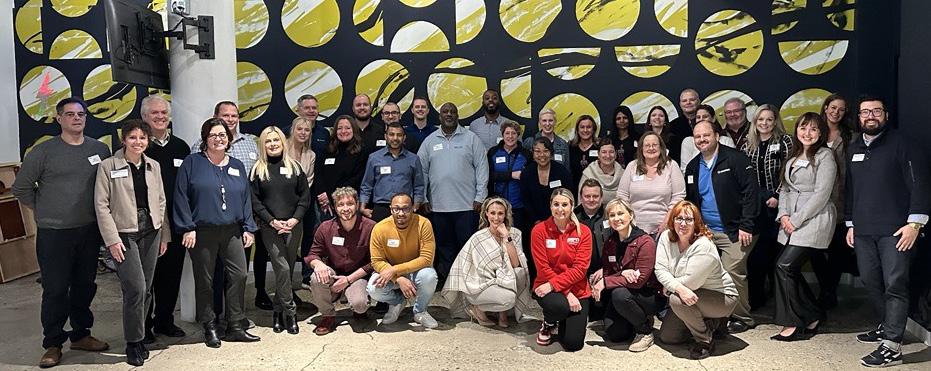


In January The Networking Forum groups participated in the ultimate showdown - The 2nd Annual Networking Forum Team Olympics at the 3rd Street Market Hall.
Attendees had a blast with games like shuffleboard, bean bag toss, spoons and garbage can basketball. It wasn’t just about the competition; it was their chance to mix and mingle with participants from other groups.
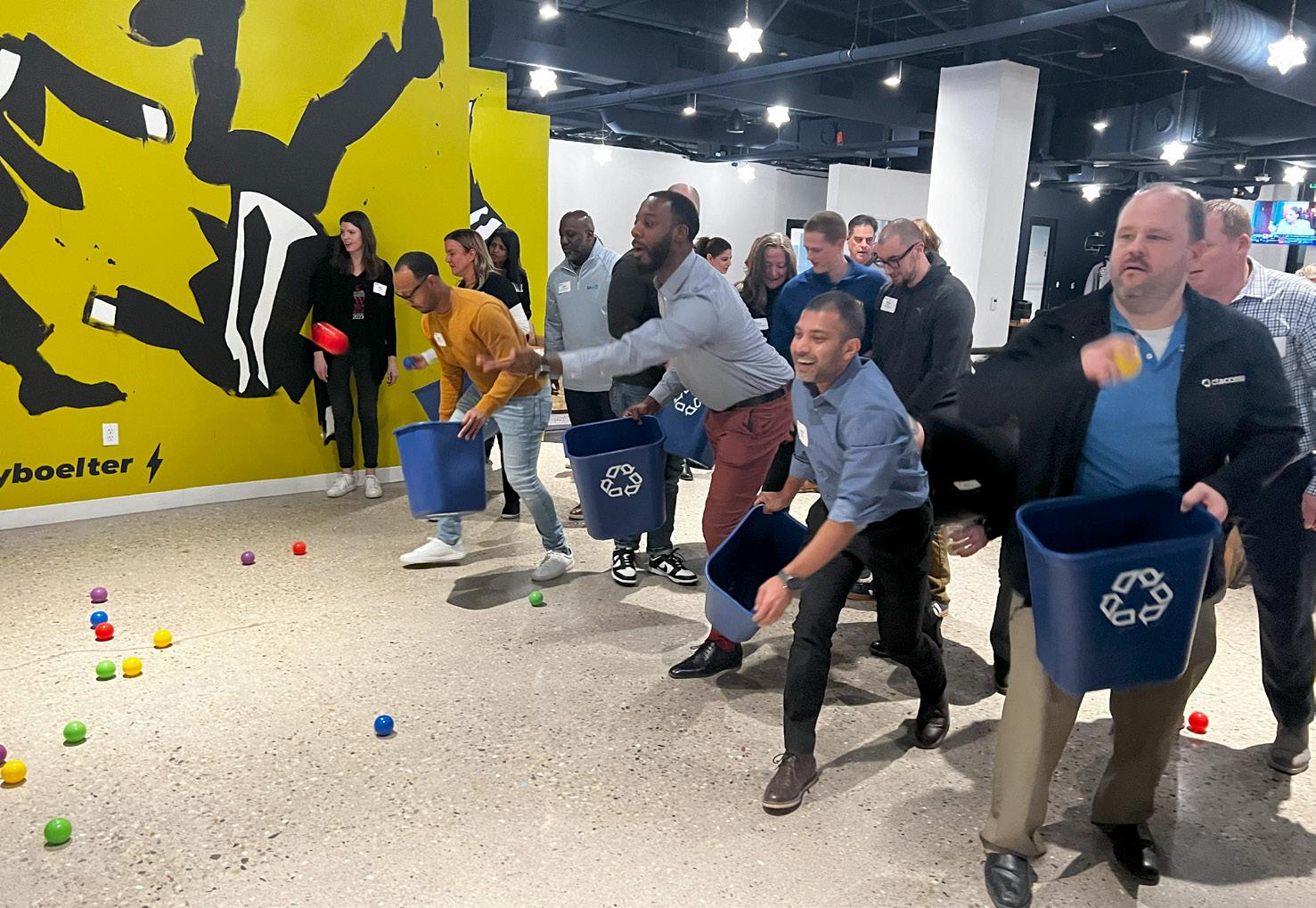
The Networking Forum is a structured platform for sales and marketing professionals to build trusting relationships. Participants expand their business network for the purpose of developing sales referrals and closing more business. Multiple groups of sales professionals meet twice a month. Each Networking Forum Group consists of approximately 15 participants. MMAC.org/
.html


The Networking Forum Program through the MMAC is an excellent way to stay connected and engaged in the Milwaukee area. I truly value the connections and quality business relationships I have made throughout many years.”
Ruth Benben Principal, Capital Investment Services of America

I joined the Networking Forum six years ago for new leads and contacts. Since then, I have had success finding new prospects and opportunities. The Networking Staff has been supportive and I would recommend the Networking Forum to others looking to make new contacts and grow their business.
 Scott Pohlmann Director of Business Development Milwaukee Electronics
Scott Pohlmann Director of Business Development Milwaukee Electronics

 Derek Deprey Facilitator & Coach
Derek Deprey Facilitator & Coach

Managers often get sidetracked by work-related challenges, employees who may be off track, and their own overwhelming to-do list. While these realities are often a part of daily work life, true leaders are also intentional about developing emerging leaders. Emerging leaders are the next generation of trailblazers, visionaries, and change-makers who are poised to shape the future.
These people embody the values of integrity, humility, and authenticity by modeling what true leadership looks like. Emerging leaders are not defined by their titles but by their actions. They embrace continuous learning and fearlessly tackle challenges.
Take a moment to identify people with the most potential in your circle. Who are the rising stars waiting to shine? Make a list of 2-3 people you envision growing into impactful leaders.
Review the 4 C’s with each person on your list.
Are they magnetic?
People must like them and want to work with them.
Does integrity flow?
Good character makes trust possible.
Can they weather the storm? These individuals must be able to handle the stress and workload of leadership.
Contribution
Is success their shadow? They have a track record of achievement.
Start today by prioritizing the growth of your emerging leaders. Elevate your leadership by focusing your efforts where they matter most. Your impact starts with them!






When it comes to implementing technology and artificial intelligence in your food and beverage-related business, making assumptions can be a good thing.
“Assume your employees are using it on their own time on their own devices,” explains Sarah Alt, Chief Process & AI Officer of law firm Michael Best. “And assume your competitors are using it and could surpass you.”
 Emily Allen Communications Director FaB Wisconsin
Emily Allen Communications Director FaB Wisconsin
AI and value-added technology has infiltrated the business world. While there’s space for skepticism, its proliferation in day-to-day life makes it difficult to disregard in a business setting.
“Even if you attempted to block access to OpenAI’s ChatGPT or Google’s Bard anytime in the last nine to 12 months, they have since started offering these capabilities built into their browsers,” Alt says. “It’s common to feel like this is a constant game of ‘keeping up’ with technology companies, which can be daunting for even the mightiest of us.”
Companies like Miron Construction are up to the challenge, leaning into technologies to better serve their clients in the food and beverage manufacturing space.


Athey says Miron’s use of AI and technology is mindful. He said, “without controlled collaboration, you have chaos” and is implemented with efficiencies in mind.
What started with the use of iPhones to capture individual photos has advanced into 360° video, allowing construction progress to be tracked and keeping clients confident in the accuracy of their projects.
Other technologies implemented by Miron, like laser scanning, can convert data into BIM (building information modeling) without the need for redundant tasks requiring blueprints and a tape measure.

Brian Athey, Director of Construction Innovation at Miron, explains that “it’s a challenge to keep up, and change management is the most important part of what I do. There’s such a thing as software fatigue, constantly going from one system to the next. We’ll never get away from that, but my job is to make sure that if we’re picking something, we’re picking the right thing.”



“Now someone can go out, drop a tripod and easily create a model. The efficiencies of that are astronomical. You’re saving trips to the job site and can be confident the dimensions are correct,” said Athey. “There’s no guessing and no mistakes that can be made there.”
Athey said these types of technology are invaluable in the food and beverage manufacturing industry, where unique equipment and processing lines can make or break a project, noting that food and beverage is “one of those industries that is ahead of the curve” in terms of AI and technology implementation and innovation.
“We had a food and beverage facility with an existing piece of equipment. We needed to know before the installer arrived … is this really going to fit in the new space? We were able to walk him through scanning the space with his iPhone, and by noon the next day, we confirmed the equipment would fit,” he said.
Alt said data is “the most essential ingredient” for artificial intelligence and technology usage in the food and beverage industry and warns that when proceeding with AI or technology initiatives, there should be absolute certainty that the application fits the business’s ethical responsibilities, as well as legal requirements.
“There are so many innovative ways AI can help predict changes in the food supply … ingredients, substitutes, consumption, growing patterns and more,” said Alt. “So let’s get those ideas out on the table, vet them and bring them to life.”


Whether it’s for an older child who missed getting braces when they were younger or someone approaching retirement, it’s never too late for orthodontia to improve smile power. Today there are many different options available to help straighten teeth. Consult with an orthodontist to determine the best treatment option for your circumstance.
Braces or clear aligners?
There are advantages and disadvantages between traditional bracket-and-wire braces and newer clear aligner tray technologies. Here are some things to consider:
• Complexity. Aligner trays are a good option for minor correction of misaligned smiles, while traditional bracket and wire methods may be the only option for more complex treatment.
• Aesthetics. Both traditional braces and aligner trays can be virtually undetectable.
• Function. Aligner trays are removeable, whereas traditional braces are attached to teeth using a strong dental adhesive. Proper oral hygiene, eating, and comfort are important considerations when choosing treatment.
• Cost and time. The cost and length of treatment can vary between braces and aligner trays
Whether for personal or professional reasons, everyone deserves a brighter and straighter smile. For less than a cup of coffee, child orthodontics can be added to a Delta Dental plan and upgraded to include adult coverage, with a very rich annual maximum of $4,000. And don’t forget – an Individual & FamilySM plan is an option if an employer-sponsored plan isn’t offered! Please reach out to me or your insurance broker to discuss how to update your comprehensive dental plan.

Jackie Bloomer
Sales Executive Delta Dental of WI
(414) 659-0481
deltadentalwi.com
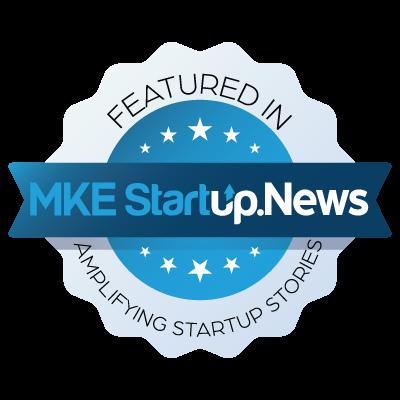
Meet Dr. Jessica Silvaggi, a key innovator in Milwaukee’s startup ecosystem.
 Anna Lardinois Storyteller Milwaukee Startup News
Anna Lardinois Storyteller Milwaukee Startup News
In July, Silvaggi became president of University of Wisconsin Milwaukee Research Foundation (UWMRF). The Connecticut native earned her PhD in Molecular and Cellular Biology from Harvard University and has worked in the organization since 2009.
UWMRF was launched in 2006 to support research and innovation at the school and help bring these developments into the marketplace. To date, the program has resulted in 189 patents and supported a number of Milwaukee’s most promising startup companies, including COnovate, Pantherics and RoddyMedical.
The impact of universities in the development of innovations that result in economic growth cannot be denied. According to a study released in 2022 by COGR, an association of research institutions, “data from 1996-2020 show that academic-industry partnerships contributed upwards of $1.9 trillion to the U.S. industry gross output, as well as $1 trillion to the gross domestic product (GDP) while supporting 6,499,000 jobs.”
According to the Metro Milwaukee Innovation DataTool developed by the Wisconsin Policy Forum, a key strength in Milwaukee’s economic indicators is the “concentration of talent in key occupations associated with innovation and economic

development.” The study indicates that Milwaukee’s high number of scientists and engineers are a future predictor of economic success because “scientists and engineers help drive innovation through research and development activities.”
The university has contributed thousands of highly skilled innovators to the local economy and the UWMRF exists to support their innovations. Silvaggi is committed to strengthening the foundation’s collaborative partnerships with Milwaukee businesses, which will benefit both innovators and the local economy.
MKEStartup.News recently spoke with Dr. Silvaggi about UWMRF and its role in Milwaukee’s startup economy.
MSUN: What is Technology Transfer?
JS: I like to use the word commercialization… Technology Transfer is basically helping move exciting new ideas, innovations, inventions and services out from the university where they’re created, and into the hands of a company to develop it to its final stage so it can be sold on the market.
So, whether it’s a small, medium, large or new startup, there has to be a company that we hand it over to.
Continued on page 31

Looking for ways to save energy at your business?
Our Energy E iciency Services team can identify energy-saving projects and rebates.
Sign up for your free consultation. Scan this code or visit we-energies.com/savings/business/free-consultation.
Continued from 29
MSUN: What are the goals of the University of Wisconsin Milwaukee Research Foundation?
JS: We like to describe ourselves first as a concierge service. We are a service organization to begin with because we want to be here for those innovative people and we want to help retain and support them, whether it’s faculty, students or staff.
Our strategic initiatives are fostering corporate partnered research, igniting startups and leveraging our intellectual property expertise. It’s about the support and education of people that are working on innovation. We have programs that help serve that purpose.
We have a seed program, the Catalyst Grant, which has been hugely instrumental. We are so grateful to the Bradley Foundation. They’ve supported us for 17 years of Catalyst Grant gifts that we award to seed fund new ideas. Without those monies, innovators won’t get the data needed to then apply to the national programs and grants.
Over the years we have awarded $5.8 million in Catalyst Grants. Those projects have been well-picked because they brought in another $38.3 million. We are over a six-fold return on investment with the Catalyst Grant. Most of our startups have gotten a Catalyst Grant at some point.
We now have a Bridge Grant. This is a great support from Wisconsin Economic Development Corporation (WEDC). They gave us funds and we had to match them and then we can give out small awards to our startups as well.
These grants keep the ball rolling and get that next thing done to attract investors.
MSUN: How will advances in AI technologies shape the future of UWMRF?
JS: We’ve had AI and machine learning involved in many of our disclosures for years, so we’ve been in that game for quite some time, especially with inventions in the Computer Science and Engineering Departments. … It has always been a part of
our portfolio of expertise with certain faculty. We’ve always dealt with it; it’s just getting more important now that we’ve got the Connected Systems Institute and the Data Science Institute focused on it.
The university is no stranger to AI, and it will be a huge focus at UWM because we are an institution located amidst big companies, and we want to work with them, and AI is what companies want to work on. We will continue to make those connections and make sure that companies know that we have the expertise to work on it.
MSUN: How can the Milwaukee business community support UWMRF?
JS: Through strategic partnerships.
We get donations and these gifts, but we don’t get to keep that money. We’re just passing it on. Some of our programs require matching funds and we cannot run them without gifts.
If companies need help in a certain area, and they don’t have a lot of research going on internally, they can work with us. For example, GE Healthcare sponsored our Catalyst Grant program for several years looking for help with imaging technologies. There was then a call for proposals and faculty submitted proposals to work on that problem. GE Medical then got to help select which proposals they thought were fitting for them to give the gift of the research.
If a company wants to direct the research, then it can do sponsored research, which means the company creates the research plan with the faculty member… and then they pay for the work to be done. The company then gets automatic rights to license it. We make this very easy through the program Panther Partnering.
It’s a really straightforward and transparent agreement… Sometimes companies get nervous and wonder ‘if this goes well, you guys are going to charge us a trillion dollars, right?’
That’s just not reality, I think they worry about that because they haven’t worked with universities very much. So, we’re trying to dispel any concerns.

MMAC has partnered with members of the Milwaukee startup comunity to elevate our region as a destination for our founders and funders. Read more stories like this at:










FUEL Bootcamp provided best practices to more than 1,000
From improving lines of communication in the workplace to getting the inside scoop on the latest technologies, area professionals learned best practices and gained a variety of skills at FUEL Milwaukee’s Professional Development Bootcamp during the first week of February.
This year’s bootcamp, held both in-person and virtually, was attended by more than 1,000 professionals.
During the week, participants had a chance to listen to some of Milwaukee’s most accomplished professionals including MMAC Senior Advisor (and former president) Tim Sheehy, Milwaukee Commissioner of City Development Lafayette Crump and Executive Director of the Wisconsin Department of Public Instruction Sachin Chheda among others.
Additionally, attendees were treated to a number of important sessions regarding topics ranging from reading basic financial statements to making datadriven decisions; from defining your personal brand to making genuine connections and cultivating trust integral to relationship building.
In between, participants got a chance to network with hundreds of other boot campers throughout the week.
A special thanks to sponsors CentroMotion, Magnolia Tax Services, Mandel Group and Radio Milwaukee. Because of their support, these sessions were free to registrants.
Thank you to our Sponsors:


Thank you to our Media Partner:


1,000+ professionals attended bootcamp in 2024
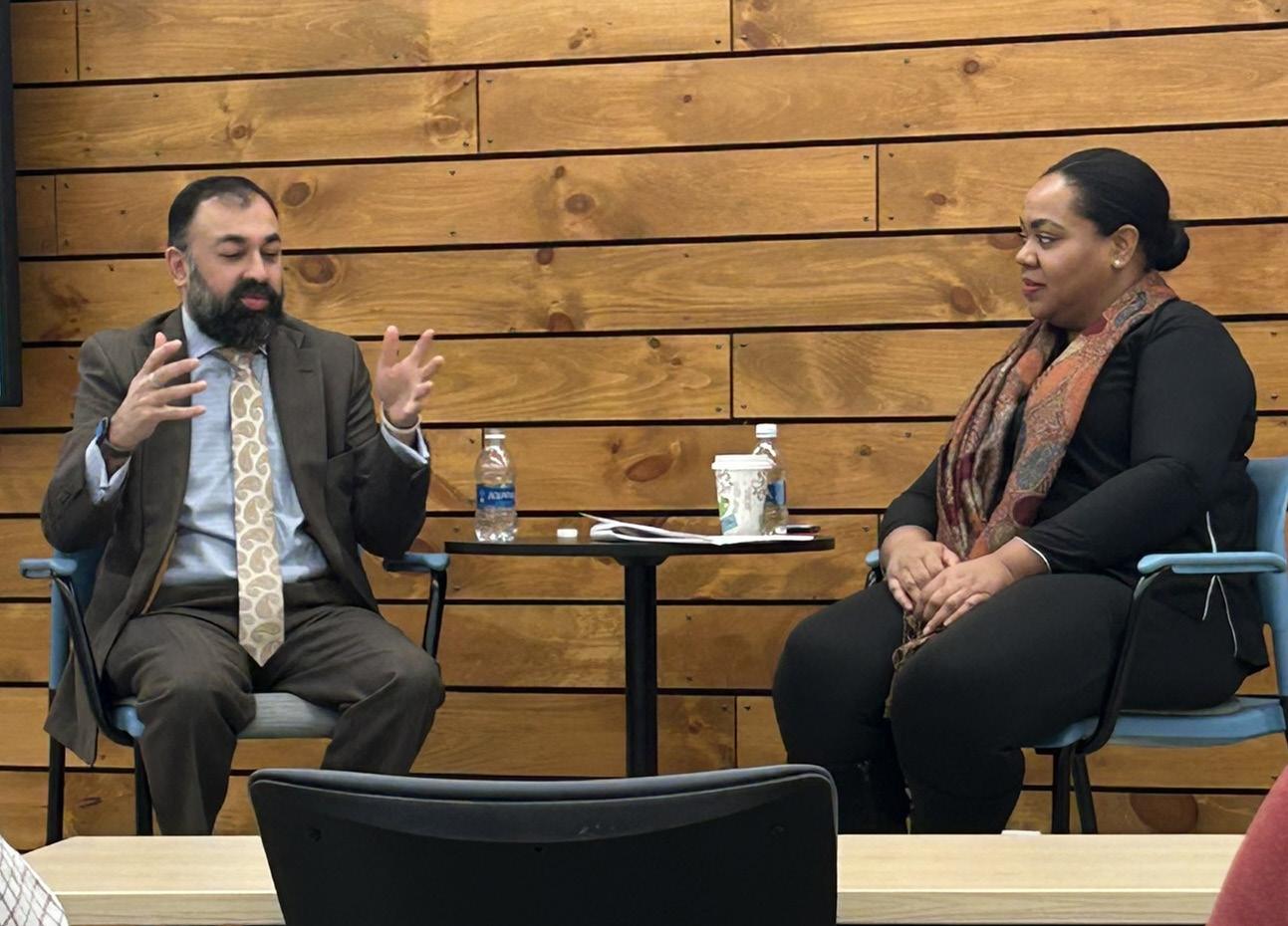
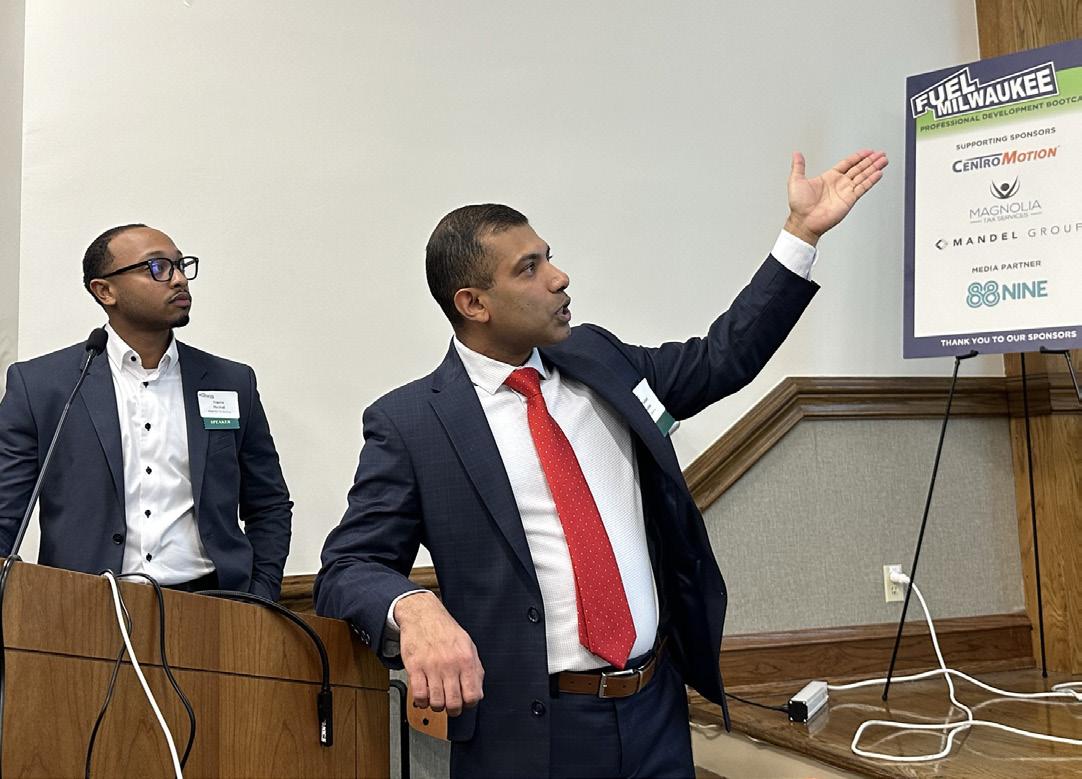 Mentorship Morning with Sachin Chheda Executive Director, WI Department of Public Instruction
Mentorship Morning with Sachin Chheda Executive Director, WI Department of Public Instruction
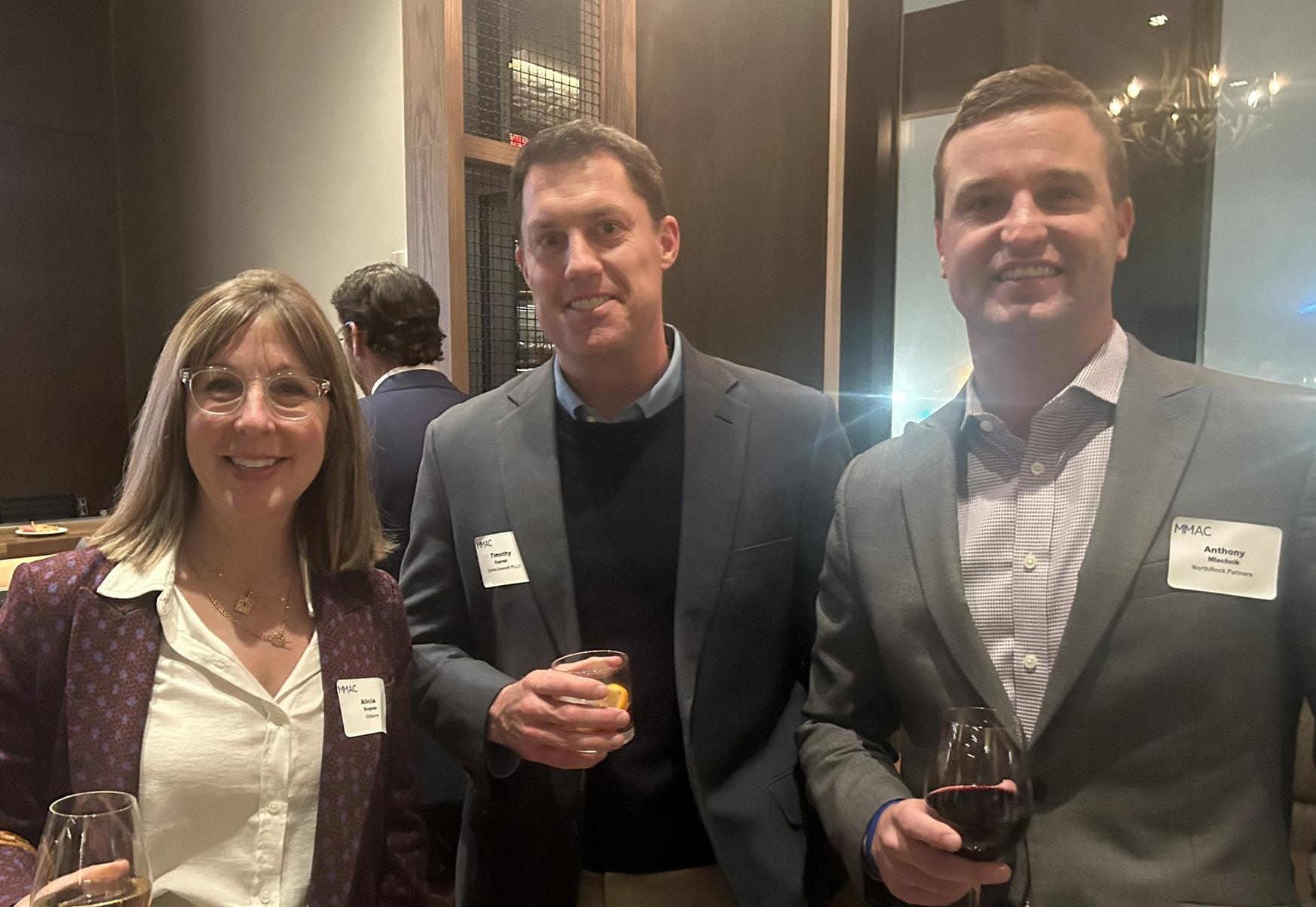
Leadership Council Members gathered for conversation and cocktails at the new Trade Hotel to meet MMAC’s new Chair, Austin Ramirez of Husco, and Dale Kooyenga, MMAC President. They heard the opportunities and challenges that the region is facing and the goals moving forward. Pictured: Alicia Dupies, Gilbane; Timothy Caprez, Dykema Gossett PLLC; and Anthony Mlachnik, NorthRock Partners
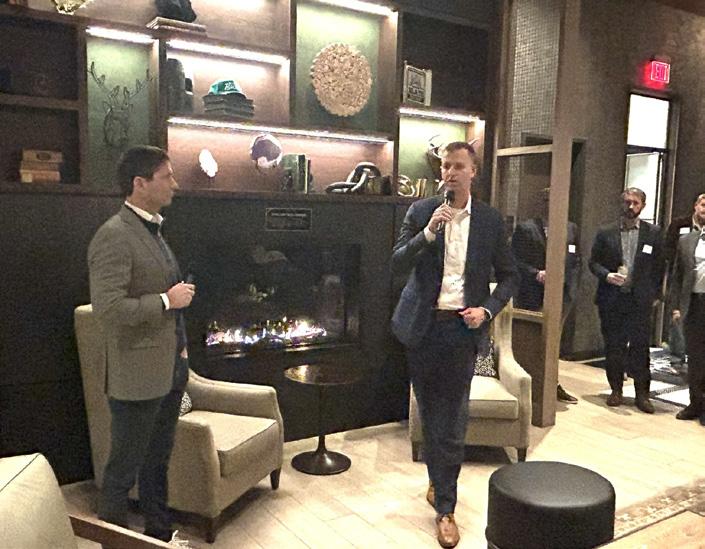
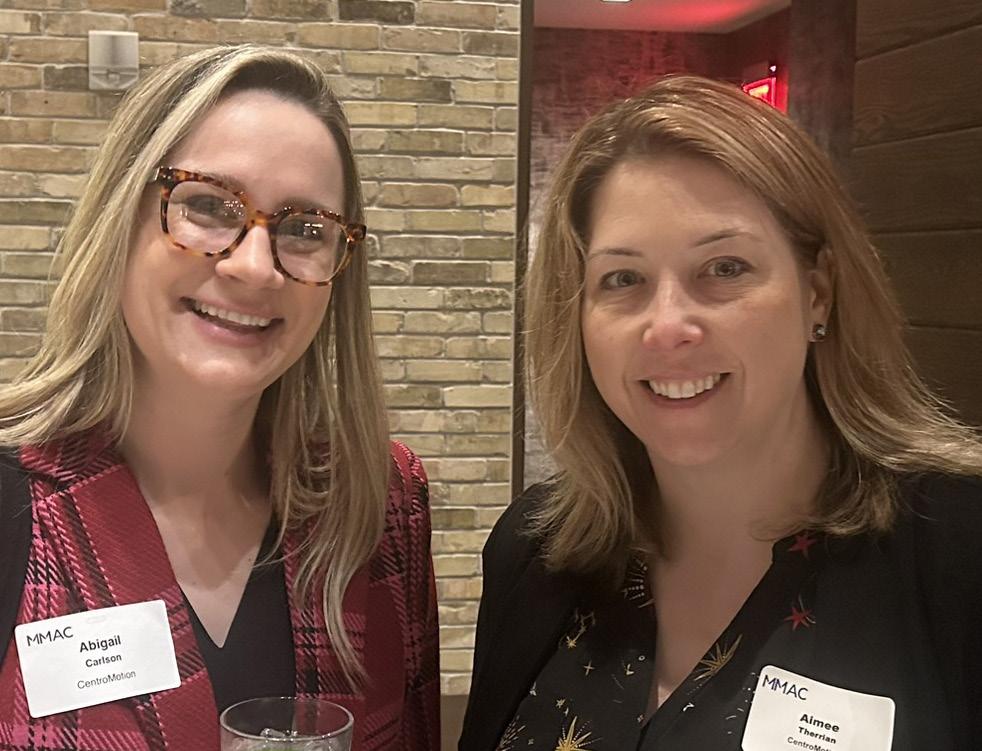


2. Austin Ramirez, Husco; Dale Kooyenga, MMAC
3. Abilgail Carlson and Aimee Therrian, CentroMotion
4. Greg Scalzo, Good Karma Brands; and Jonathan Meulemans, Dykema Gossett PLLC
5. Jaime Syring, Trans International; and Manuel Rosado, Spectrum Investment Advisors

Tim Albrecht from Milwaukee Tool shared the highlights and pitfalls that he and the team have navigated through in their endeavor to be a manufacturer of solutions.
Pictured: Lee Xiong, Linda Murphy, Cheryl LoCicero, Alicia Govek, Tara Swartz, Karen Mallak and Joe Deitlin, Molina Healthcare of Wisconsin
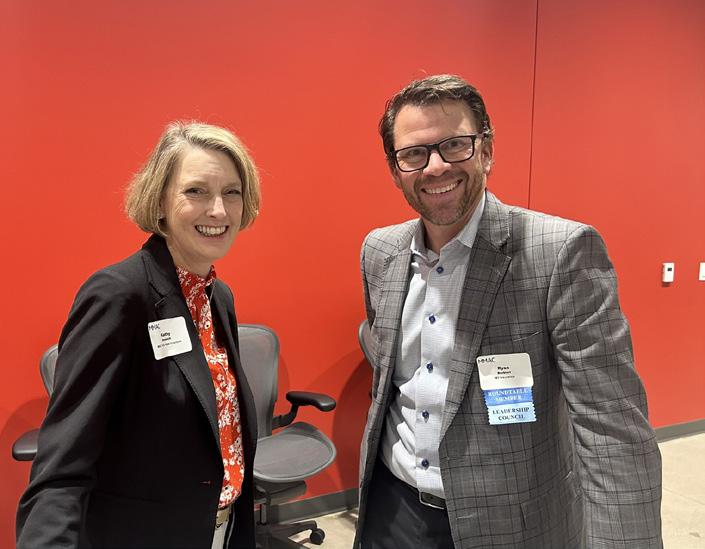



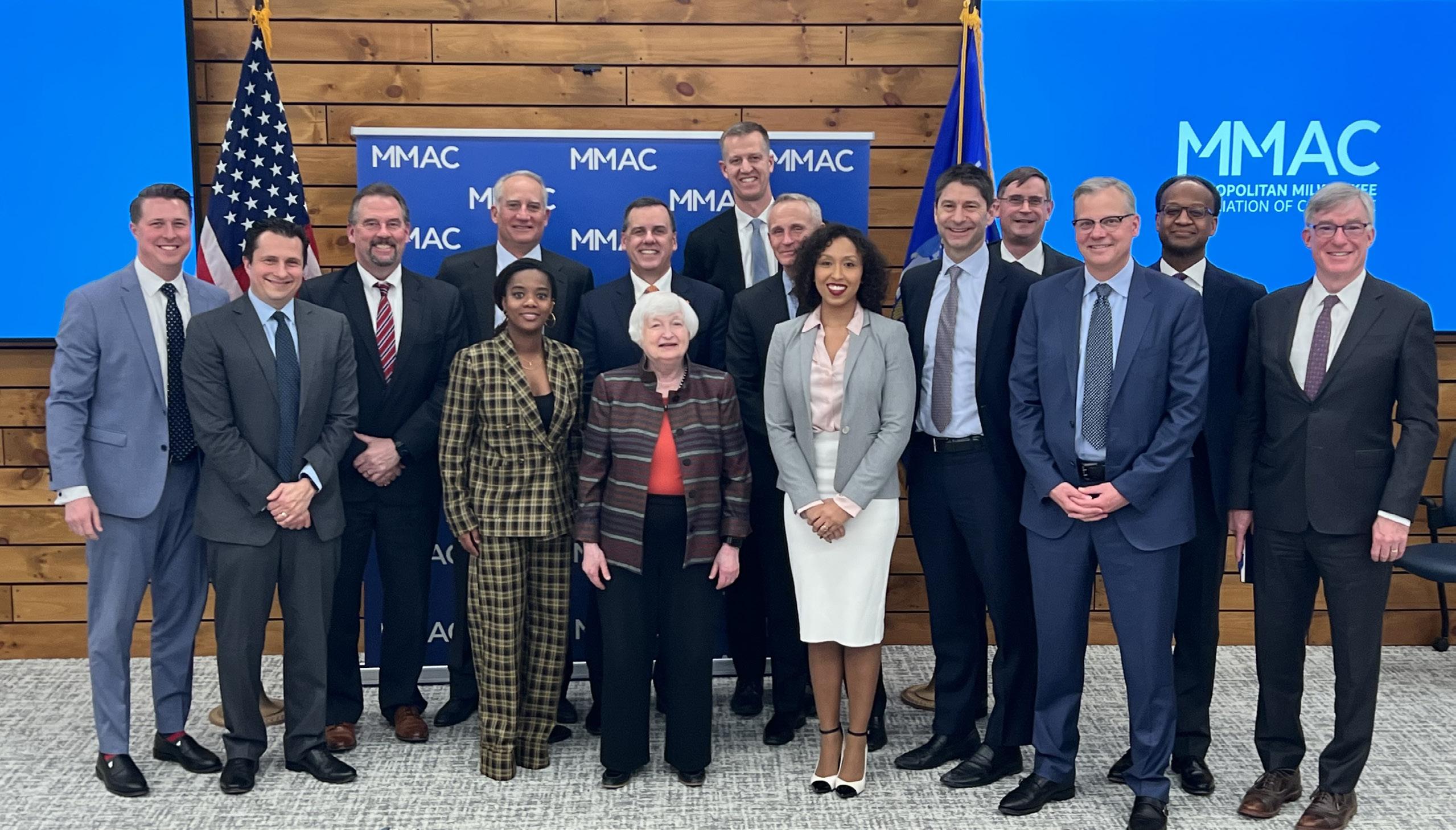



3Up Metal Works
Jason Young
CEO/President
7420 N. Teutonia Ave. Milwaukee, WI 53029
3upmetalworks.com
(414) 322-0522
Metal Fabricators
Advanced Wireless, Inc.
Darryl Morin
President & CEO
5012 W. Ashland Way Franklin, WI 53132
awimobility.com
(414) 421-2819
Computers, IT & Technology
B2E Solutions, Inc.
Laura Gaffney
VP - Client Success
1020 James Dr., Ste. O
Hartland, WI 53029
b2esolutionsinc.com
(262) 563-5200
Human Capital Management Software
Benefits Strategy Group LLC
Gregory Enes, Principal
731 N. Jackson St., Ste. 525 Milwaukee, WI 53202
benefitsstrategygroup.com
(414) 306-6560
Insurance Agents/Brokers
Borgelt, Powell, Peterson & Frauen SC
Patrick McNally, President 1243 N. 10th St., Ste. 300 Milwaukee, WI 53205
borgelt.com
(414) 276-3600
Attorneys
BrightStar
Todd Sobotka
Executive Director
710 N. Plankinton Ave., Ste. 340 Milwaukee, WI 53203
brightstarwi.org (414) 224-6000
Venture Capital
Bumble Bee Blinds of North Milwaukee
Jennie Quinn
Owner and General Manager 9055 N. 51st St., Ste. D Brown Deer, WI 53223 bumblebeeblinds.com/north -milwaukee-wi (414) 209-9600
Windows
Canadian Pacific Kansas City (CPKC) Railway
Larry Lloyd
Senior Director of Government Affairs 1702 W. Bruce St. Milwaukee, WI 53204
cpkcr.com (224) 373-1746
Transportation Services
Catalyst Exhibits
Scott Hanna
Chief Financial Officer 3919 128th Ave. Kenosha, WI 53144
catalystexhibits.com
(262) 764-5454
Exhibit DisplayDesigners/Producers
City on a Hill
Art Serna
Chief Executive Officer
2224 W. Kilbourn Ave. Milwaukee, WI 53233
cityonahillmke.org
(414) 931-6670
Social Service Organizations
Comcast Business
Evan Tenuta
Enterprise Sales Manager business.comcast.com (773) 642-0837
Telecommunications
COMFYIST
Amy Fallucca
Founder & CEO
2139 Valley Ct. Grafton, WI 53024 www.comfyist.me (414) 978-7792
Retail
Communications Engineering Co.
Chad Schulman
Business Development Manager 3080 S. Calhoun Rd. New Berlin, WI 53151
cecinfo.com
(414) 209-3903
Security Control Equipment/Systems
Craft Beverage Warehouse LLC
Kyle Stephens, President 3945 N. 31st St., Ste. B Milwaukee, WI 53216
craftbevwarehouse.com
(414) 433-9175
Printers
Continued page 38
Continued from page 37
D’vaxva’s Portable Parties LLC
Doris Jones, CEO
6650 W. State St., Unit D256 Milwaukee, WI 53213
dvaxvasportableparties.com
(855) 382-9827
Party Supplies/Rentals
DesignsTouch
Nim Joshi, CEO
930 E. Knapp St., Ste. 25 Milwaukee, WI 53202
designstouch.com
(414) 928-5111
Internet-Website Design & Development
E-Plan Exam
David Adam Mattox President
12605 W. North Ave., Ste. 189 Brookfield, WI 53005
eplanexam.com
(414) 736-4721
Construction Companies
Expeditors MKE Office
Katelynn Skillrud District Sales Executive 9675 S. 54th St., Ste. 1 Franklin, WI 53132 expeditors.com (414) 448-7996
Logistics/Transportation
Hansen Reynolds LLC
Tim Hansen Founding Partner
301 N. Broadway, Ste. 400 Milwaukee, WI 53202
hansenreynolds.com
(414) 273-8473
Legal Services
Integrated Merchandising Solutions, a division of Omnicom Global
Terry Rowinski Chief Operating Officer
10100 58th Pl. Kenosha, WI 53144 imsretail.com (847) 583-3800
Marketing Consultants



Continued from page 39
Southeast Sales Powersports
John Erdmann, CEO
6930 N. 76th St. Milwaukee, WI 53223 southeastsales.com
(414) 463-2540
Motorcycle Dealers
St. Augustine
Preparatory Academy
Kelsey Brenn
Chief Financial Officer
2607 S. 5th St. Milwaukee, WI 53207
augprep.org
(414) 810-1380
Education
Stratus Building Solutions of Milwaukee
Darrel McNeal Owner / Operator 1100 Commerce Dr., Ste. 113 Mount Pleasant, WI 53406 stratusclean.com
(262) 977-5287
Janitorial Services
The Leonard Company
Laura Duguid
Regional Sales Director, Appraiser
345 W. Washington Ave., Ste. 317 Madison, WI 53703 theleonardcompany.com (608) 502-0700
Appraisers
Vesta Senior Network
Jenny Wagner Co-Owner and Elder Care Advocate
7830 W. Wisconsin Ave. Milwaukee, WI 53213 vestaseniornetwork.com
(414) 253-1435
Consultants
Western Building Products
Anne Literski
Human Resources Manager
7007 N. 115th St. Milwaukee, WI 53224 western1.com (414) 258-4686
Building Materials/Supplies

Make a difference in the community when your company supports the Zoological Society! Get your brand in front of more than 1 million guests a year.
BECOME A CORPORATE PLATYPUS CIRCLE MEMBER
• Transferable Membership Cards to share with employees
• Name recognition with one of WI’s top family attractions
• Special Zoo benefits for your employees
• Invitations to VIP events
• Rental discounts and more Go to BeAPlaty.org to learn more.
GRANT OPPORTUNITIES
• Evidence-based, awardwinning education programs
• Access programs for underserved populations
• Local and global conservation efforts





• Event and attraction opportunities
• Boost your brand and community support
• Engage with current and potential customers

Contact Mary Kay Gundlach at 414-918-6155 to learn how you can take advantage of these exciting opportunities.






NOVEMBER 2023 - JANUARY 2024
120 years
A.O. Smith Corporation
BMO
Mandel Graphic Solutions
105 years
Goodwill Industries of Southeastern Wisconsin and Metropolitan Chicago
85 years
Sprinkmann Sons Corporation
75 years
Boelter Companies
Deloitte
Ernst & Young
Great Lakes Rubber & Supply, Inc.
dba Great Lakes Industrial
Poblocki Sign Company
Pritzlaff Wholesale Meats
70 years
CG Schmidt
Derse
WaterStone Bank
Wells
65 years
Marquette University
60 years
Godfrey & Kahn SC
M&M Office Interiors
Maybar Manufacturing Co.
55 years
Scribner Cohen & Co. SC
50 years
Milwaukee Admirals
40 years
Hatch Staffing Services
Waukesha County Technical College
30 years
Gross Automation
MahlerClean
25 years
Core Creative
20 years
Chortek
Core Business Solutions
DeWitt LLP Law Firm
FPZ
Gustave A. Larson Company
IEWC
Independence First Munson
15 years
HellermannTyton Corporation
Industrial Recyclers
Lakeland Supply
Menards
SITE Staffing
UMOS
10 years
Applied Tech
ClearPath Connections
Pindel Global Precision
Rishi Tea
Wangard Partners, Inc.
5 years
Boyle Fredrickson SC
Flores Automation
Hmong Wisconsin Chamber of Commerce
InCheck
Injectec Pathways High
PPG
Real Time Automation
UW-Milwaukee Joseph J. Zilber College of Public Health
Wisconsin Institute of CPAs (WICPA)
1 year
0 Tolerance Security
AK Development
Allied Tool Products
Alta Direct Amazon
American Fashion Network
Atlas & Company
Be Better ERC Consulting
Cafe Corazon - Brown Deer
Consilium WI
Copeland
Fons Law Group
Glenroy
GROTH Design Group
Health Insurance Associates
Integrum Coaching / EOS
Kalmbach Media
Lean Design Werks
Milwaukee Academy of Science
MKR
Molina Healthcare of Wisconsin
North Hall Partners
PartsBadger
PCE Investment Bankers
Progressive Community Health Centers
Spoerl Commercial
Terra Translations
TWO MEN AND A TRUCK Milwaukee
USO Wisconsin
Video Wisconsin
Wisconsin Humane Society

Jeff Bannink comes to MMAC with more than 25 years of experience leading high-impact initiatives and teams through both consulting and corporate roles.
Since 2017, Jeff worked as an independent management consultant partnering with clients to tackle a variety of issues spanning strategy, operations and organizational behavior.
Prior to 2017, when he left full-time corporate employment to engage with consulting clients and complete his doctoral degree in Management, Jeff held executive roles at Dohmen Life Science Services and Caterpillar/Bucyrus in Milwaukee. Before moving to Milwaukee with his family in 2009, Jeff spent seven years at Nike in Oregon and three with McKinsey & Company in Chicago.
Jeff and his wife live in Shorewood, where the last of their three children will graduate from high school and leave the nest this year. Jeff holds a Doctorate in Business Administration from the University of Florida, a postgraduate degree in international relations from the University of Amsterdam (Netherlands), an MBA from Purdue University and a bachelors in engineering physics from Hope College.

Katie Mendenhall joins the Milwaukee 7 team after spending the last year project managing Medicaid policy initiatives at Wisconsin’s Department of Health Services. Prior to her work at DHS, she spent four years at Epic in Madison where she managed the implementation of electronic health record solutions for various healthcare systems around the country.
On the M7 team, Katie will serve as the Director of Corporate Attraction & Expansion, working to attract national and global companies to southeastern Wisconsin and helping companies expand their business in the region.
She holds a public policy and leadership degree from the University of Virginia and resides in Bay View with her partner and dog. Outside of work, she enjoys running, reading, and exploring Milwaukee’s food scene.
MMAC.org/Staff.html
Corporate Expansion & Attraction
Jim Paetsch | jpaetsch@mke7.com
Economic Development
Lynn Olberding | lolberding@mke7.com
Economic Trends & Research
Bret Mayborne | bmayborne@mmac.org
Federal, State & Local Government
Andrew Davis | adavis@mmac.org
Equity & Inclusion
Corry Joe Biddle | cbiddle@mmac.org
GROW YOUR PEER NETWORKS
AALAM
Walter Lanier | wlanier@aalamilwaukee.org
The Business Council
Marjorie Rucker | mrucker@mmac.org
Executive Roundtables
Chauntele Kreutz | ckreutz@mmac.org
Food & Beverage Industry
Gina Balke | gbalke@fabwisconsin.com
Hispanic Collaborative
Nancy Hernandez | nhernandez@mmac.org
Leadership Council
Barb Smith | bsmith@mmac.org
Networking Forums
Marjorie Yoshida | myoshida@mmac.org
Recruiters Roundtable
Corry Joe Biddle | cbiddle@mmac.org
GAIN EXPOSURE FOR YOUR BUSINESS
Advertising
Jane Trenchard-Backes | jbackes@mmac.org
Events & Sponsorship
Karen Powell | kpowell@mmac.org

Interested in advertising in the next issue of Milwaukee Commerce? Details at mmac.org/advertising.html
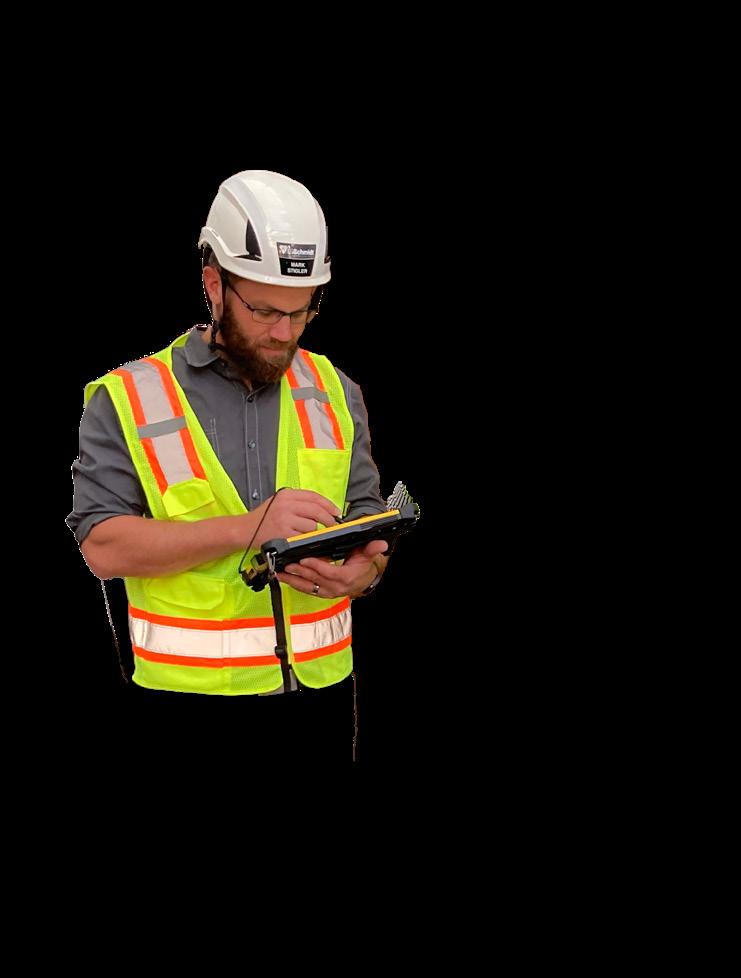


At CG Schmidt, we don’t just build buildings. We leverage artificial intelligence and technology as powerful tools to create more integrated, efficient and cost-effective project outcomes. Our virtual design construction teams apply advanced 3D modeling to improve how your project is planned and constructed, pushing the boundaries of what the industry has to offer. Join us in building a better tomorrow, today.

